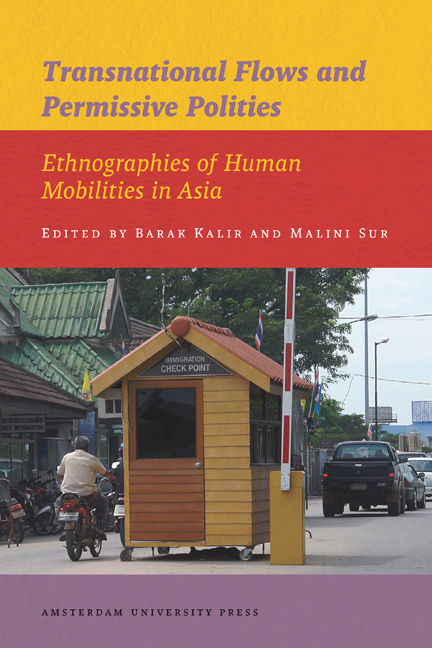Book contents
- Frontmatter
- Contents
- List of Tables, Maps, Figures and Photographs
- Acknowledgements
- Introduction: Mobile Practices and Regimes of Permissiveness
- 1 Illegality Rules: Chinese Migrant Workers Caught up in the Illegal but Licit Operations of Labour Migration Regimes
- 2 Contesting the State of Exception in the Afghan-Pakistani Marchlands
- 3 ‘Looking for a Life’: Rohingya Refugee Migration in the Post-Imperial Age
- 4 Smuggling Cultures in the Indonesia-Singapore Borderlands
- 5 Trade, Transnationalism and Ethnic Infighting: Borders of Authority in Northeast Borneo
- 6 Bamboo Baskets and Barricades: Gendered Landscapes at the India-Bangladesh Border
- 7 Moving between Kerala and Dubai: Women Domestic Workers, State Actors and the Misrecognition of Problems
- 8 Emigration of Female Domestic Workers from Kerala: Gender, State Policy and the Politics of Movement
- 9 Mainland Chinese Migrants in Taiwan, 1895-1945: The Drawbacks of Being Legal
- 10 ‘Playing Edge Ball’: Transnational Migration Brokerage in China
- Epilogue: Irregular Mobilities and Disjunctive Moralities
- About the Editors and Contributors
- Bibliography
- Index
- Publications Series
6 - Bamboo Baskets and Barricades: Gendered Landscapes at the India-Bangladesh Border
Published online by Cambridge University Press: 15 January 2021
- Frontmatter
- Contents
- List of Tables, Maps, Figures and Photographs
- Acknowledgements
- Introduction: Mobile Practices and Regimes of Permissiveness
- 1 Illegality Rules: Chinese Migrant Workers Caught up in the Illegal but Licit Operations of Labour Migration Regimes
- 2 Contesting the State of Exception in the Afghan-Pakistani Marchlands
- 3 ‘Looking for a Life’: Rohingya Refugee Migration in the Post-Imperial Age
- 4 Smuggling Cultures in the Indonesia-Singapore Borderlands
- 5 Trade, Transnationalism and Ethnic Infighting: Borders of Authority in Northeast Borneo
- 6 Bamboo Baskets and Barricades: Gendered Landscapes at the India-Bangladesh Border
- 7 Moving between Kerala and Dubai: Women Domestic Workers, State Actors and the Misrecognition of Problems
- 8 Emigration of Female Domestic Workers from Kerala: Gender, State Policy and the Politics of Movement
- 9 Mainland Chinese Migrants in Taiwan, 1895-1945: The Drawbacks of Being Legal
- 10 ‘Playing Edge Ball’: Transnational Migration Brokerage in China
- Epilogue: Irregular Mobilities and Disjunctive Moralities
- About the Editors and Contributors
- Bibliography
- Index
- Publications Series
Summary
Introduction
My contribution argues for plural engagements with undocumented border crossings. I posit that trans-border mobilities, especially in regions where borders divide similar societies, are located at the intersection of sovereign violence and social legitimacies. This paper explores such intersections by following bodies in motion, and bodies that are selectively intercepted and deported at the heavily patrolled and militarised India-Bangladesh border. I advance that borders have lethal yet fluid dispositions. The aggressive policing of borders coexists with local and trans-border legitimacies that accommodate undocumented border crossings.
Illustrations from the highly secured United States border with Mexico expose how border controls enhance the visibility and performance of policing rather than actually reducing clandestine migration and smuggling. State visibility at borders induces more sophisticated ways of moving people and commodities, often escalating the risks involved by dependency on brokerage and dangerous journeys (Andreas 2000: 8-9; Nevins 2010: 14). Often because borders and border crossings are projected as lethal, migration laws impede women's transnational mobility under the guise of protection. For instance, women's labour migration is frequently restricted or prevented by framing them as infantile, victims or docile citizens. Such restrictions compel women to undertake dangerous forms of migration (Kapur 2005: 118; Kodoth & Varghese in this volume).
That militarisation and border violence provoke scholarly engagements with migrant deaths, bodily abjection and the sexual oppression of women is not surprising. These are global border conditions. The India-Bangladesh border is no exception. India is constructing a new high security border fence with Bangladesh, a neighbouring country that is increasingly imagined as a shelter and conduit for terrorism. In the past decade, at least one unauthorised border crosser on average has been shot to death by Indian border guards every third or fourth day at the India-Bangladesh border (Human Rights Watch 2010). Scholars have called this a ‘killer border’ (Van Schendel 2005: 296) and depict this region as a liminal zone of ‘exception’ (Jones 2009: 889). Several stretches of the India-Bangladesh borderland function as a source and transit area for sex trafficking. Endemic poverty, social imbalance, political violence and militarisation marginalise women, especially those belonging to minority communities (Banerjee 2010: 115).
- Type
- Chapter
- Information
- Transnational Flows and Permissive PolitiesEthnographies of Human Mobilities in Asia, pp. 127 - 150Publisher: Amsterdam University PressPrint publication year: 2012
- 1
- Cited by



